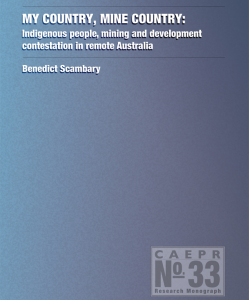Abstract
 Agreements between the mining industry and Indigenous people are not creating sustainable economic futures for Indigenous people, and this demands consideration of alternate forms of economic engagement in order to realise such 'futures'. Within the context of three mining agreements in north Australia the study considers Indigenous livelihood aspirations and their intersection with sustainable development agendas. The three agreements are the Yandi Land Use Agreement in the Central Pilbara in Western Australia, the Ranger Uranium Mine Agreement in the Kakadu region of the Northern Territory, and the Gulf Communities Agreement in relation to the Century zinc mine in the southern Gulf of Carpentaria in Queensland.
Agreements between the mining industry and Indigenous people are not creating sustainable economic futures for Indigenous people, and this demands consideration of alternate forms of economic engagement in order to realise such 'futures'. Within the context of three mining agreements in north Australia the study considers Indigenous livelihood aspirations and their intersection with sustainable development agendas. The three agreements are the Yandi Land Use Agreement in the Central Pilbara in Western Australia, the Ranger Uranium Mine Agreement in the Kakadu region of the Northern Territory, and the Gulf Communities Agreement in relation to the Century zinc mine in the southern Gulf of Carpentaria in Queensland.
Recent shifts in Indigenous policy in Australia seek to de-emphasise the cultural behaviour or imperatives of Indigenous people in undertaking economic action, in favour of a mainstream conventional approach to economic development. Concepts of 'value', 'identity', and 'community' are key elements in the tension between culture and economics that exists in the Indigenous policy environment. Whilst significant diversity exists within the Indigenous polity, Indigenous aspirations for the future typically emphasise a desire for alternate forms of economic engagement that combine elements of the mainstream economy with the maintenance and enhancement of Indigenous institutions and 'livelihood' activities. Such aspirations reflect ongoing and dynamic responses to modernity, and typically concern the interrelated issues of access to and management of 'country', the maintenance of Indigenous institutions associated with family and kin, access to resources such as cash and vehicles, the establishment of robust representative organisations, and are integrally linked to the derivation of both symbolic and economic value of livelihood pursuits.
Dr Benedict Scambary is an anthropologist with over 15 years of experience working in the Northern Territory. In 2007 he completed a PhD at the Centre for Aboriginal Economic Policy Research at The Australian National University, under the ARC project 'Indigenous Community Organisations and Miners: Partnering Sustainable Regional Development?' with industry partners Rio Tinto and the Committee for Economic Development Australia. His dissertation is the basis of this monograph. Dr Scambary is now the Chief Executive Officer of the Aboriginal Areas Protection Authority in the Northern Territory.
Book Launch
Professor Matthew Gray
Director, Centre for Aboriginal Economic Policy Research
warmly invites you to celebrate the book launch of
My Country, Mine Country: Indigenous People, Mining and Development Contestation in Remote Australia by Dr Benedict Scambary
Launch by Professor Jon Altman
to be held on
Monday 19 August 5.00–6.30pm
The Common Room, University House, The Australian National University
RSVP Monday 12 August
To confirm your attendance, please contact Tracy Deasey
Tracy.Deasey@anu.edu.au T 02 6125 0587